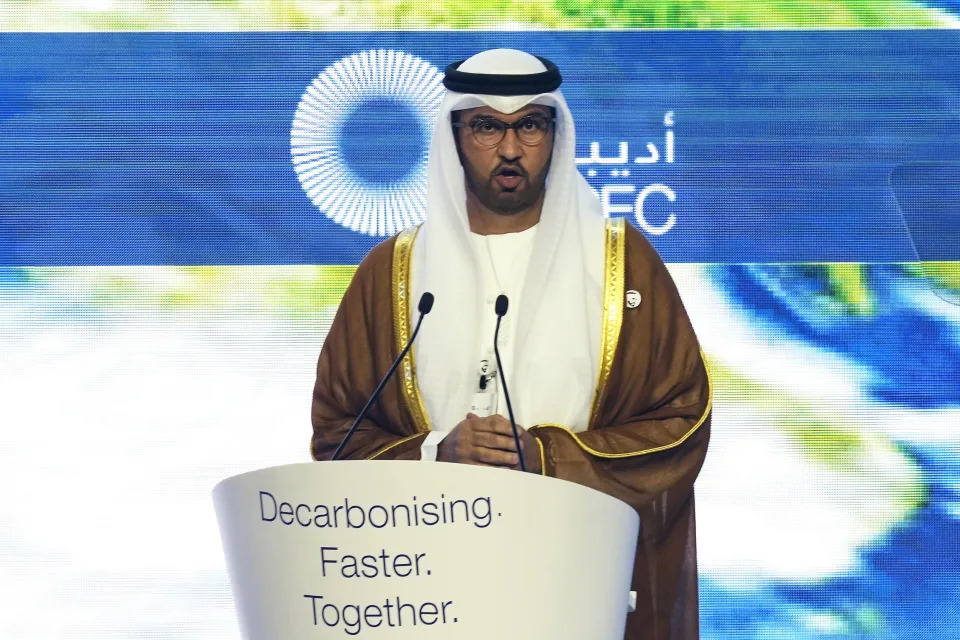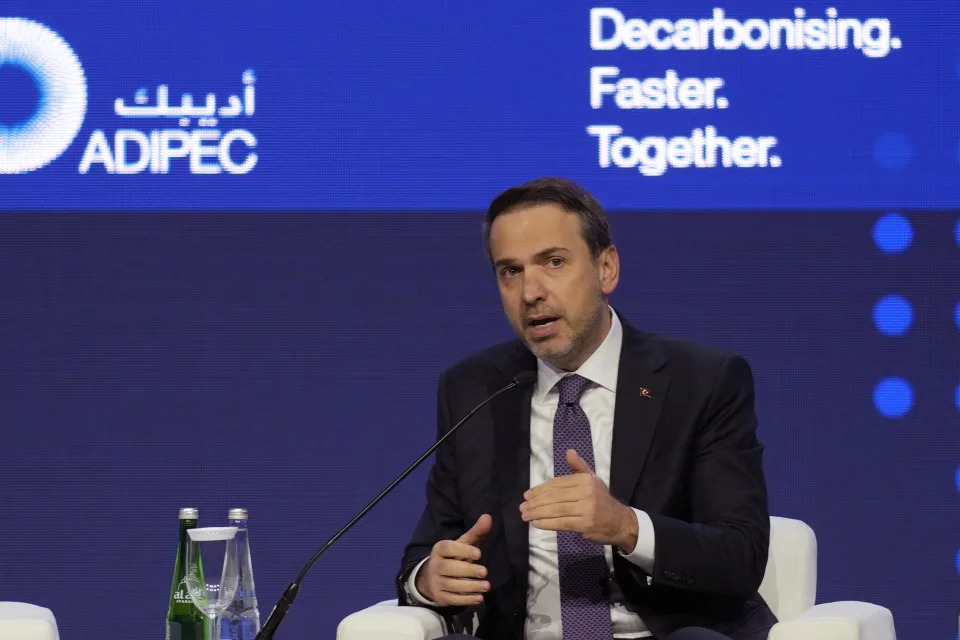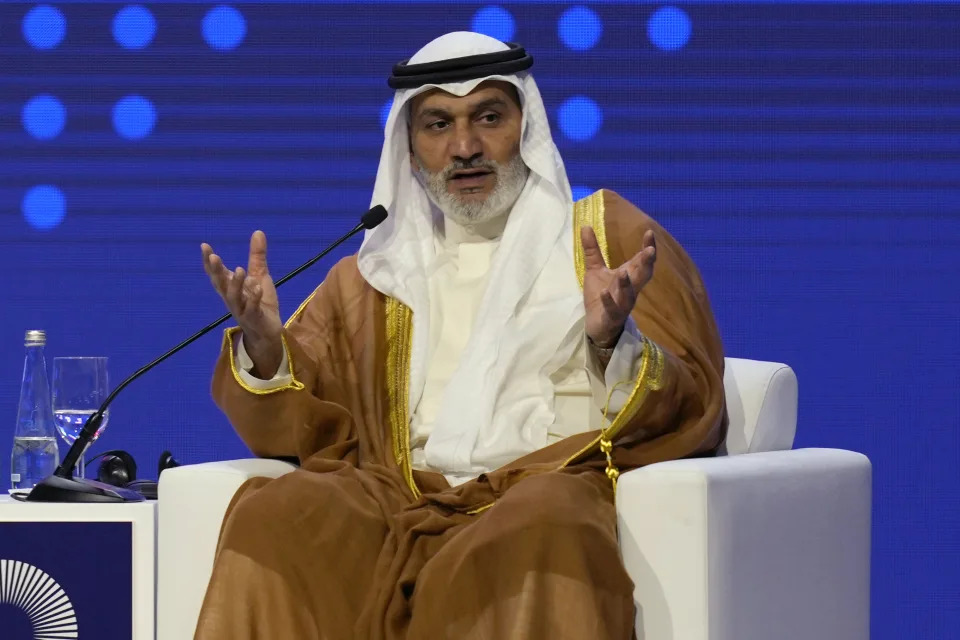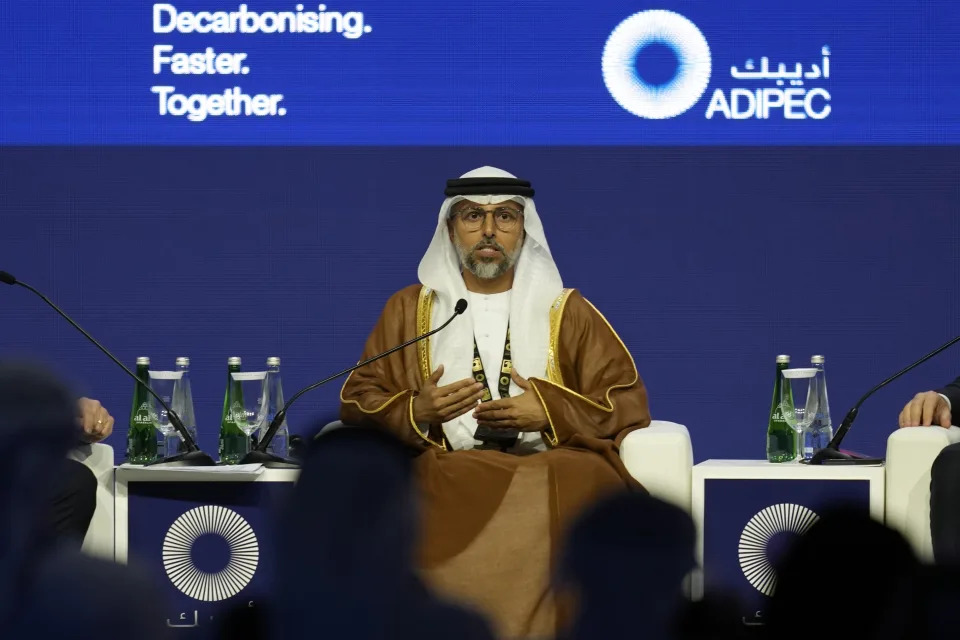JON GAMBRELL
Updated Mon, October 2, 2023






United Arab Emirates Energy Minister Suhail al-Mazrouei talks during the ADIPEC, Oil and Energy exhibition and conference in Abu Dhabi, United Arab Emirates, Monday Oct. 2, 2023.
(AP Photo/Kamran Jebreili)
ABU DHABI, United Arab Emirates (AP) — The Emirati president-designate of the upcoming United Nations COP28 climate talks urged oil and gas companies Monday to be “central to the solution” for climate change, a message delivered even as the industry boosts its production to enjoy rising global energy prices.
The appeal by Sultan al-Jaber highlights the gap between climate activists suspicious of his industry ties and his calls to drastically slash the world's emissions by nearly half in seven years to limit global warming to 1.5 degrees Celsius (2.7 degrees Fahrenheit) compared with pre-industrial times.
While addressing a major international concern, his remarks came at a marquee oil industry event highlighting the state oil company he oversees — feeding the concerns of those already critical of his appointment while also drawing applause from the same energy firms he wants to court at the upcoming COP28 talks starting in November.
“That is our North Star. It is, in fact, our only destination,” al-Jaber said. “It is simply acknowledging and respecting the science.”
However, he added: “We must do this while also ensuring human prosperity by meeting the energy needs of the planet’s growing population."
Al-Jaber serves as the CEO of the state-run Abu Dhabi Oil Co., which has the capacity to pump 4 million barrels of crude oil a day and hopes to reach 5 million barrels a day. He also made the call to the annual Abu Dhabi International Petroleum Exhibition and Conference, known by the acronym as ADIPEC, which brings together the largest players in the oil and gas industries.
While this year's conference has been described as focusing on “decarbonizing faster together,” the event is primarily about the drilling, processing and sale of the same carbon-belching fuels driving climate change — which cause more-intense and more-frequent extreme events such as storms, droughts, floods and wildfires. And al-Jaber himself has repeatedly said the world must rely on oil and gas for the near-term to bridge that gap.
“A phase-down of fossil fuels is inevitable. In fact, it's essential,” al-Jaber said. “Yet, this must be part of a comprehensive energy transition plan that is fair, that is fast, just, orderly, equitable and responsible.”
But on the business side, the oil industry is on the rebound. After prices briefly went negative during the lockdowns of the coronavirus pandemic, benchmark Brent crude now trades around $92 a barrel.
Diesel prices also are expected to rise as Russia has stopped its exports of the fuel, which likely will worsen global inflation through boosting transportation prices that will get passed onto consumers.
Gazprom, the state-owned natural gas company that is a pillar of Russia’s economy, had a major stand at the conference despite facing U.S. sanctions over Moscow's war on Ukraine. Russian officials took part in Abu Dhabi's major arms fair earlier this year, showing the UAE's deepening financial ties to Moscow despite its long ties to the American military and hosting thousands of U.S. troops.
The conference highlights the challenge the United Arab Emirates has faced in trying to convince already-critical climate scientists, activists and others that it can host the U.N. Conference of the Parties — where COP gets its name.
Though all smiles at Monday's conference, al-Jaber has acknowledged the withering criticism he's faced. On Saturday, he offered a full-throated defense of his country hosting the talks he's slated to lead, dismissing critics who “just go on the attack without knowing anything, without knowing who we are.”
“For too long, this industry has been viewed as part of the problem, that it’s not doing enough and in some cases even blocking progress,” al-Jaber told the conference. “This is your opportunity to show the world that, in fact, you are central to the solution.”
Following immediately after al-Jaber, OPEC Secretary-General Haitham al-Ghais praised his speech and defended the oil industry.
“We see calls to stop investing in oil. We believe this is counterproductive,” al-Ghais said. “The cornerstone of global economic prosperity today is energy security.”
Al-Jaber said 20 oil and gas companies had pledged to be “net zero” by or before 2050 and eliminate routine gas flaring by 2030. However, the industry would still be producing the oil and gas that release the carbon dioxide that traps heat in the atmosphere.
Al-Jaber, a 50-year-old longtime climate envoy, has been behind tens of billions of dollars spent or pledged toward renewable energy by this federation of seven sheikhdoms on the Arabian Peninsula. Al-Jaber and his supporters — including U.S. climate envoy and former Secretary of State John Kerry, who is on a trip to the UAE this week — say that's a sign he can lead the COP28 talks.
Meanwhile, Turkish Energy Minister Alparslan Bayraktar said at the Abu Dhabi conference that an Iraqi-Turkish oil pipeline that had been halted for months would see its flow restart this week.
“As of today, the pipeline is ready to operate,” he said. “And within this week we will start operating the Iraqi-Turkey pipeline, which after the resuming of oil operations, will be able to supply half a million barrels to the oil market.”
He did not elaborate on what the terms would be for the 970-kilometer (600-mile) pipeline, which is Iraq's largest. In March, Iraqi officials won an international arbitration case to halt oil exports from the semiautonomous Kurdish region to Ceyhan, Turkey, on the Mediterranean Sea.
Iraqi and regional Kurdish government officials did not immediately acknowledge the pipeline reopening, though Iraq's oil minister has said it was anticipated, without elaborating. Gulf Keystone Petroleum Ltd., which operates Shaikan oil field in Kurdish region of Iraq, saw its stock jump up by over 20% in trading Monday on the London Stock Exchange on news of the pipeline restarting.
Bayraktar said the pipeline also sustained damage in the recent earthquake and flooding in Turkey that had been repaired.
___
Follow AP's coverage of the climate and environment: https://apnews.com/climate-and-environment
Oil Latest: Industry Is Part of Energy Change, Executives Say
ABU DHABI, United Arab Emirates (AP) — The Emirati president-designate of the upcoming United Nations COP28 climate talks urged oil and gas companies Monday to be “central to the solution” for climate change, a message delivered even as the industry boosts its production to enjoy rising global energy prices.
The appeal by Sultan al-Jaber highlights the gap between climate activists suspicious of his industry ties and his calls to drastically slash the world's emissions by nearly half in seven years to limit global warming to 1.5 degrees Celsius (2.7 degrees Fahrenheit) compared with pre-industrial times.
While addressing a major international concern, his remarks came at a marquee oil industry event highlighting the state oil company he oversees — feeding the concerns of those already critical of his appointment while also drawing applause from the same energy firms he wants to court at the upcoming COP28 talks starting in November.
“That is our North Star. It is, in fact, our only destination,” al-Jaber said. “It is simply acknowledging and respecting the science.”
However, he added: “We must do this while also ensuring human prosperity by meeting the energy needs of the planet’s growing population."
Al-Jaber serves as the CEO of the state-run Abu Dhabi Oil Co., which has the capacity to pump 4 million barrels of crude oil a day and hopes to reach 5 million barrels a day. He also made the call to the annual Abu Dhabi International Petroleum Exhibition and Conference, known by the acronym as ADIPEC, which brings together the largest players in the oil and gas industries.
While this year's conference has been described as focusing on “decarbonizing faster together,” the event is primarily about the drilling, processing and sale of the same carbon-belching fuels driving climate change — which cause more-intense and more-frequent extreme events such as storms, droughts, floods and wildfires. And al-Jaber himself has repeatedly said the world must rely on oil and gas for the near-term to bridge that gap.
“A phase-down of fossil fuels is inevitable. In fact, it's essential,” al-Jaber said. “Yet, this must be part of a comprehensive energy transition plan that is fair, that is fast, just, orderly, equitable and responsible.”
But on the business side, the oil industry is on the rebound. After prices briefly went negative during the lockdowns of the coronavirus pandemic, benchmark Brent crude now trades around $92 a barrel.
Diesel prices also are expected to rise as Russia has stopped its exports of the fuel, which likely will worsen global inflation through boosting transportation prices that will get passed onto consumers.
Gazprom, the state-owned natural gas company that is a pillar of Russia’s economy, had a major stand at the conference despite facing U.S. sanctions over Moscow's war on Ukraine. Russian officials took part in Abu Dhabi's major arms fair earlier this year, showing the UAE's deepening financial ties to Moscow despite its long ties to the American military and hosting thousands of U.S. troops.
The conference highlights the challenge the United Arab Emirates has faced in trying to convince already-critical climate scientists, activists and others that it can host the U.N. Conference of the Parties — where COP gets its name.
Though all smiles at Monday's conference, al-Jaber has acknowledged the withering criticism he's faced. On Saturday, he offered a full-throated defense of his country hosting the talks he's slated to lead, dismissing critics who “just go on the attack without knowing anything, without knowing who we are.”
“For too long, this industry has been viewed as part of the problem, that it’s not doing enough and in some cases even blocking progress,” al-Jaber told the conference. “This is your opportunity to show the world that, in fact, you are central to the solution.”
Following immediately after al-Jaber, OPEC Secretary-General Haitham al-Ghais praised his speech and defended the oil industry.
“We see calls to stop investing in oil. We believe this is counterproductive,” al-Ghais said. “The cornerstone of global economic prosperity today is energy security.”
Al-Jaber said 20 oil and gas companies had pledged to be “net zero” by or before 2050 and eliminate routine gas flaring by 2030. However, the industry would still be producing the oil and gas that release the carbon dioxide that traps heat in the atmosphere.
Al-Jaber, a 50-year-old longtime climate envoy, has been behind tens of billions of dollars spent or pledged toward renewable energy by this federation of seven sheikhdoms on the Arabian Peninsula. Al-Jaber and his supporters — including U.S. climate envoy and former Secretary of State John Kerry, who is on a trip to the UAE this week — say that's a sign he can lead the COP28 talks.
Meanwhile, Turkish Energy Minister Alparslan Bayraktar said at the Abu Dhabi conference that an Iraqi-Turkish oil pipeline that had been halted for months would see its flow restart this week.
“As of today, the pipeline is ready to operate,” he said. “And within this week we will start operating the Iraqi-Turkey pipeline, which after the resuming of oil operations, will be able to supply half a million barrels to the oil market.”
He did not elaborate on what the terms would be for the 970-kilometer (600-mile) pipeline, which is Iraq's largest. In March, Iraqi officials won an international arbitration case to halt oil exports from the semiautonomous Kurdish region to Ceyhan, Turkey, on the Mediterranean Sea.
Iraqi and regional Kurdish government officials did not immediately acknowledge the pipeline reopening, though Iraq's oil minister has said it was anticipated, without elaborating. Gulf Keystone Petroleum Ltd., which operates Shaikan oil field in Kurdish region of Iraq, saw its stock jump up by over 20% in trading Monday on the London Stock Exchange on news of the pipeline restarting.
Bayraktar said the pipeline also sustained damage in the recent earthquake and flooding in Turkey that had been repaired.
___
Follow AP's coverage of the climate and environment: https://apnews.com/climate-and-environment
Oil Latest: Industry Is Part of Energy Change, Executives Say
Anthony Di Paola and Salma El Wardany
Mon, October 2, 2023

(Bloomberg) -- Ministers and oil industry chiefs are gathering for the biggest energy conference in the Middle East as crude heads toward $100 a barrel. Whether prices can hold at these levels and the outlook for OPEC+ supply cuts are among topics that will be discussed from Monday.
But this year, climate is looming large over the forum. Delegates at the annual Adipec summit in Abu Dhabi, which has been dominated by oil in its long-running history, will devote a lot of their time to the energy transition. The meeting comes just two months ahead of the United Arab Emirates also hosting the crucial COP28 conference.
All times UAE
Oil Firms Must Be Heard in COP28, Executives Say (5:04 p.m.)
The oil industry is part of the energy transition and its voice should be heard at COP28, executives including Halliburton Co. CEO Jeff Miller, Liam Mallon of Exxon Mobil and Gordon Birrell of BP, said in a panel discussion.
Companies need to upgrade downstream operations to lower emissions, while a transformation of upstream operations is also required, they said.
Electrification of operations, carbon-capture and emissions detection can support the decarbonization process, they said.
Shell CEO Says Investors Will Decide If Low Carbon Is Viable (2:50 p.m.)
Shareholder needs to make a judgment on whether the low-carbon energy options that Shell Plc is pursing are viable, Chief Executive Officer Wael Sawan said.
“We need to be able to cover our cost of capital and make a return for our shareholders,” he said.
Oil Industry Is Central for Energy Transition: COP28 Chief (4:23 p.m.)
Large swathes of the global oil industry will pledge to eliminate methane emissions and gas flaring by the end of the decade, the president of the COP28 climate summit said.
More than 20 private and state oil and gas producers have made the commitment alongside setting targets to reach net zero by 2050, Sultan Al Jaber said. He did not name the companies.
Adnoc Testing Geothermal Energy for Cooling (3:24 p.m.)
Adnoc, the main oil producer in the United Arab Emirates, is testing using geothermal energy for district cooling in a preliminary program, as the country seeks to diversify energy sources.
The company is also studying capturing carbon in acquifers, said Musabbeh Al Kaabi, executive director of low-carbon solutions and international growth. Adnoc said Sunday it is doubling its carbon-capture target in a push toward net zero emissions.
UAE Warns About Lack of Oil Investment as It Boosts Own Capacity (2:30 p.m.)
The global oil industry has been losing capacity in the last few years due to a lack of investment, said United Arab Emirates Energy Minister Suhail al Mazrouei.
The minister rebuffed concerns about rising oil prices, arguing that crude needs to be high enough to justify making new investments. The UAE will expand its own capacity to 5 million barrels a day by 2027, Mazrouei said. From 2025, OPEC+ output quotas will be based on the latest capacity numbers, not outdated figures, he said.
Non-OPEC+ Oil Supply Is Outstripping Demand Growth: Yergin (2:11 p.m.)
Oil production in countries that are not part of the OPEC+ alliance, such as the US and Canada, is growing faster than demand, Dan Yergin, vice chairman at S&P Global Inc., said in a Bloomberg TV interview. Still, continued supply curbs by Saudi Arabia can be worrying because of concerns over global economic growth.
India Is Telling Oil Producers That Prices are Too High (1:54 p.m.)
India has “a constant dialogue with all producing countries where we keep raising this point” that crude prices are too high, Pankaj Jain, secretary at the Ministry of Petroleum and Natural Gas, said in an interview.
His country isn’t comfortable with current oil prices, which are near $93 a barrel in London, and “we need more production now,” Jain said. While India acknowledges OPEC’s right to decide how much they produce, the group’s cuts have increased prices.
“High prices lead to demand destruction,” Jain said. “Our viewpoint is we are finding these prices difficult to pass, difficult to continue to meet our energy needs.”
BP’s Interim CEO Reiterates No Change in Strategy (1:30 p.m.)
There will be no change in BP Plc’s strategy that was laid out in February, following the abrupt departure of Bernard Looney as head of the company, interim CEO Murray Auchincloss said.
“That’s a strategy that’s endorsed by the management team and endorsed by the board and a person leaving does not change the strategy,” he said. “We remain firmly committed to it.”
Looney resigned last month after admitting he had not fully disclosed relationships with colleagues. BP’s head of US operations, David Lawler, has also quit to pursue other opportunities outside the company.
Also read: BP Ends Its Week of CEO Chaos With Many Unanswered Questions
Iraq Official Says Ceyhan Pipeline Can’t Restart Yet (1:11 p.m.)
An Iraqi official cast doubt on a statement from Turkey that a key pipeline bringing oil from northern Iraq to the Mediterranean coast can resume this week.
Flows can’t restart until commercial and financial issues have been resolved, the official said, speaking on condition of anonymity. Earlier on Monday, Turkish Energy Minister Alparslan Bayraktar said the pipeline will resume operations this week. The oil conduit, which can carry almost half a million barrels of crude a day, has been offline since March amid a payment dispute between Ankara and Baghdad.
OPEC+ Has ‘Right Policy’: UAE Energy Minister (11:22 a.m.)
OPEC+ currently has the “right policy” for the oil market, the UAE’s Mazrouei said in an interview at the Adipec conference in Abu Dhabi.
Prices will increase if there’s no further investment in the industry, he said, adding that OPEC isn’t setting a price target.
Iraq Oil Pipeline Will Resume This Week (11:08 a.m.)
A crude oil pipeline running from Iraq’s Kurdistan region to the Mediterranean coast of Turkey will resume operations this week, Turkish Energy Minister Alparslan Bayraktar said.
The pipeline was shut earlier this year after an arbitration court ordered Ankara to pay about $1.5 billion in damages to Iraq for transporting oil from Kurdistan without Baghdad’s approval.
Citi Says Oil to Collapse to Low $70s in 2024 (9:53 a.m.)
Brent crude will collapse to the low $70s a barrel next year as the global market swings back to a surplus, according to Citigroup Inc. The shift reflects “more oil coming into the market,” analysts including Ed Morse said in a quarterly report.
“Higher prices in the near term could make for more downside for prices next year,” the Citi analysts said.
Oil Markets Will Continue to Tighten, Halliburton Says (9:18 am)
There’s a lot of support for oil prices and the market will continue to tighten, Halliburton Co. Chief Executive Officer Jeff Miller said in a Bloomberg TV interview at the Adipec conference.
The company is returning cash for our shareholders, he said.
Also read: Halliburton Sees US Gas Glut Freeing Up Gear for Oil Explorers
Deeper OPEC+ Production Curbs Unlikely: Eni (9:00 am)
The Organization of Petroleum Exporting Countries and its allies are unlikely to deepen their production cuts, Eni SpA CEO Claudio Descalzi said in a Bloomberg TV interview. Crude prices in London rose almost 10% last month as ongoing supply curbs squeeze the market.
A lack of investments in projects is the main issue for oil, while demand remains strong, Descalzi said.
--With assistance from Nayla Razzouk, Ben Bartenstein, Leen Al-Rashdan, Salma El Wardany and Yousef Gamal El-Din.
Nilanjan Banerjee
Mon, October 2, 2023

Economies across the world are gradually transitioning to cleaner energy sources. There has been a steady increase in pressure on energy companies to act on climate change on multiple fronts. Most analysts believe that although renewable energy will meet future energy needs, oil and natural gas demand will not be completely wiped out.
The U.S. Energy Information Administration, in its Annual Energy Outlook 2023, revealed that through 2050, renewables will increasingly match power demand. Thus, there are abundant opportunities for energy companies with a footprint in oil and gas resources or transporting commodities and the renewable energy space. Three such companies are Shell plc SHEL, Eni SpA E and Enbridge Inc ENB, which are well-poised to gain in the long run.
3 Stocks
Growing renewable business at a rapid pace is among the core strategies of Shell. In the renewable energy front, Shell has roughly 50 gigawatts (GW) of renewable generation capacity, considering projects either in operation, under construction or in the pipeline. Thus, for renewables and energy solutions, SHEL is investing actively in solar energy, wind energy, electric vehicle charging and others.
To implement the production of renewable energy, Plenitude, a benefit company, was established and is being controlled by Eni. To counter the decarbonization challenge, renewable energy generation is among the key strategies of Eni. This is reflected in its ambitious goal for more than 15 GW of installed renewable energy generating capacity by 2030.
Enbridge has been investing in wind farms, solar energy, geothermal projects and power transmission developments, reflecting the company's strong focus on renewables. Considering all the renewable energy projects that are either operational or under construction, Enbridge boasts a net of 2,173 megawatts of zero-emission energy generating capacity.
No comments:
Post a Comment